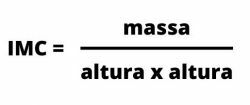BMI means Body mass index and it is a measure of the Weight of each person, being a relationship between the person's mass and their height squared.
From this calculation, it is possible to assess whether the person has a ideal weight or if you are underweight or overweight. Both levels below, as levels above the ideal weight, can pose risks to the individual's health.
This is an international benchmark measure recognized by the WHO(World Health Organization). It is a simple calculation to assess weight, but it does not directly measure body fat, as it does not include the lean mass, fat mass, fluids and bone structure of the person in question.
How to calculate BMI?
To determine the BMI, simply divide the individual's weight (mass) by their height squared. The mass must be defined in kilograms (kg) and the height in meters (m).

Let's look at an example of BMI calculation:
- A person who weighs 58 kg and measures 1.65 meters:
BMI = 58 / 1.65 x 165
BMI = 24.1
Observing the table below, it can be seen that this person is within the ideal weight range, but is close to the following range, where he would be considered overweight.
BMI table
| Classification | BMI(kg/m)2) |
|---|---|
| very underweight | Less than 18.5 |
| Normal | 18,5 - 24,9 |
| Overweight | 25 - 29,9 |
| Grade I obesity | 30 - 34,9 |
| Grade II obesity | 35 - 39,9 |
| Grade III obesity | greater than 40 |
Why is it important to know your ideal weight?
Although it doesn't differentiate between lean mass and fat mass, the BMI is a quick and practical test that can give evidence about the health of individuals.
When the person is underweight, it can be an indication of malnutrition. A person may be malnourished due to illness or insufficient nutrition, for example.
When the person is above the ideal weight, it is likely that there is excess fat in the body, which increases the risk of health problems, such as obesity, cardiovascular diseases, hypertension, cholesterol, heart attack and diabetes.
Excess fat can be caused by a sedentary lifestyle and also by an inadequate diet.
The Body Mass Index must be kept between 18.5 and 24.9, but this information alone is not enough to assess a person's health. It is necessary to consult health professionals for a complete diagnosis.
Limitations of the BMI index
The BMI index is not valid in all cases. For kids, seniors, pregnant women and very muscular people, the assessment of the ideal weight must be made considering the specificities of the organisms in these situations.
- Kids: the fat content varies over the years. Thus, it is necessary that the evaluation consider the indexes according to the age group;
- Seniors: the elderly have a different proportion of lean mass and body fat due to the natural loss of muscles, which must be considered when defining their ideal weight;
- Pregnant women: as the baby's weight is not considered in the BMI calculation, a pregnant woman could be considered above the ideal weight with the simple application of this index;
- Very muscular person: as the test does not differentiate between fat and muscle tissue, a person with a lot of muscle could have a similar BMI result to an obese person.
See also the meanings of sedentary lifestyle, obesity and hypertension.
